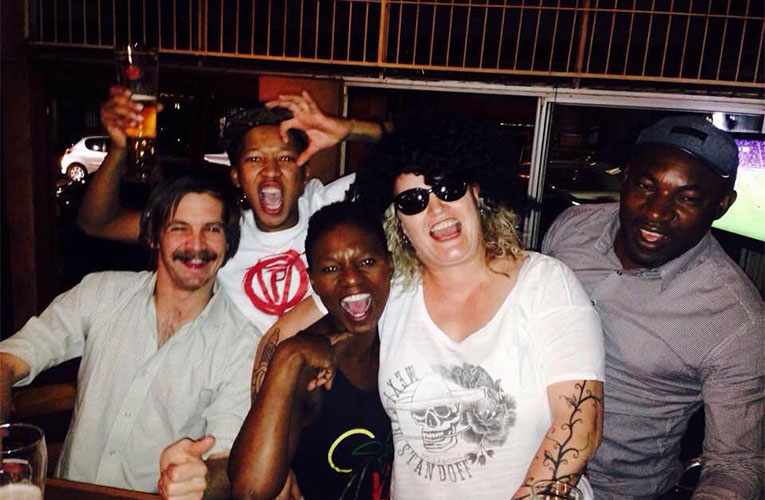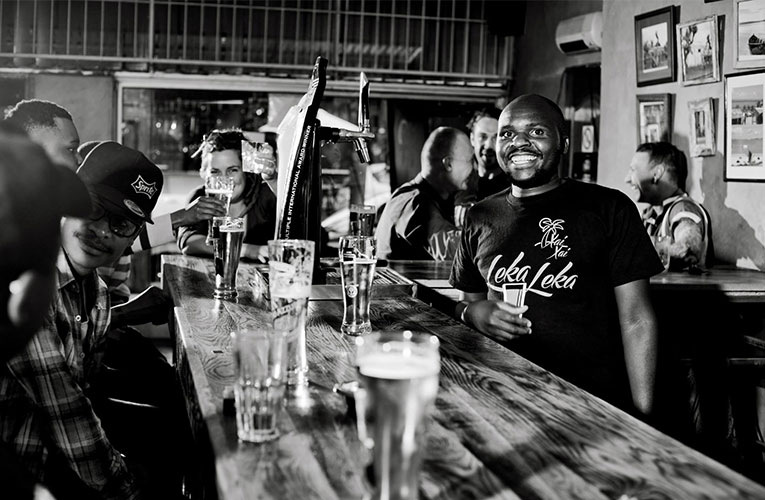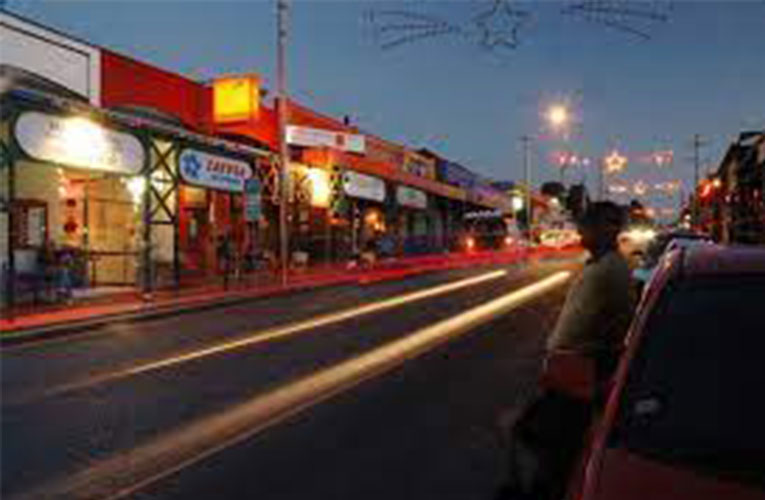Lockdown reduces Melville to a proper village in a remotest corner of South Africa
My one man tourist adventure Saturday tour of Melville exposed me to a suburb I hardly recognized with no life, restaurants and bars closed, and largely deserted.
By Edward Tsumele, CITYLIFE/ARTS Editor

Today, Monday, July 5, 2021, marks the seventh day since South Africa went to Level 4 of the coronavirus risk adjusted lockdown, mainly due to the resurgence of infections. President Cyril Ramaphosa took the country to this heightened level that comes with more restrictions in response to the Third Wave currently sweeping through the country and that has seen hospitals run short of beds and oxygen because of the big number of people that have fallen sick after getting infected, especially in the past few weeks. Weekend newspapers reported a worrying picture of the situation of infection, particularly in Gauteng.
“On Wednesday, the positivity rate shot up in Gauteng to 37% compared with a national average of 24.9%, Dr Mary Kawonga, chairperson of the Gauteng Covid-19 command board, said on Thursday.
According to the World Health Organisation, an epidemic is “under control” if this rate is 5%.
By yesterday (Saturday, July 3), there were already 6 259 Covid-19 patients in Gauteng hospitals, of whom 1 191 were in intensive care, according to data from the National Institute for Communicable Diseases. In the Western Cape, there were 359 patients in high care on Friday. Even this relatively small number is 28% higher than a week ago.
Figures in Gauteng hospitals increased by 1 081 within a week. More than half of the 11 149 Covid-19 patients in hospitals nationwide are in Gauteng – more than double what was recorded on the crest of the second wave. At the peak of hospitalisations during the second wave, there were 5 526 Covid-19 patients in hospitals in Gauteng,” reported City Press newspaper yesterday, Sunday, April 4, 2021.
Among other restrictions no gatherings are allowed, neither is the sale of alcohol in restaurants, bottle stores, pubs, taverns and Shisanyamas. In addition people are not allowed to leave or visit Gauteng unconditionally.
Now these restrictions are well meant as really the situation of the Third Wave is dire and already we have heard of excess death especially in Gauteng this time around, and those statistics of excess deaths tell an important story in the context of Covid-19 – and it is that a lot of these excess deaths are as a result of the devastation of the coronavirus.
But the cost of the devastation of the coronavirus goes far much beyond the excess death, especially in the long term. Covid-19-is decimating the economy of this country, just like it is doing the economies of the rest of the world. And this cost might not be obvious right now, but it will soon have a human face too, just like the death of people close to us that we are starting to witness as a result of Covid-19.
The non human cost of Covid-19 is also devastating. Many people we know will soon be unemployed and will be unable to look after their families. Companies will soon start retrenching people, and getting a job for the unemployed, especially the youth, will be even harder. A cursory glance at business activities around us will immediately tell of a story of a grim future as a result of the devastation by Covid-19 to the economy.
Over the weekend, on Saturday, July 3, 2021, one day short of the seven days since we went into Level 4, I visited some of the busy places of entertainment, dining and other social human activities that make Joburg the heart beat of South Africa.
I went to Melville, a well known place of good vibes, food, drink, entertainment and generally, a place that provides a good weekend out experience for friends, family and visitors alike.
At about 1.30pm, I shot straight into the nerve centre of Melville’s entertainment, 7 Street. What I saw there did not resemble the Melville that we all know, a vibrant colorful place full of life. Seven Street was deserted, the usual teeming eateries, bars and shops selling designer clothes and nice things, with the exception of a few places selling pizza, burgers and cakes, had their doors closed.

Usually this place is famous for its village-like atmosphere in the middle of a big metropolis like Johannesburg, and yet it still feels and looks like a suburb. That is usually what drives urban weary nomads, tired of malls and high walled suburbs to this place in the first place. But on Saturday, the place was a proper village in a remote part of South Africa. I am not sure whether even its usual crowd would identify the place as their favourite Melville deep in suburbia, that has so much life, to an extent that visitors to Johannesburg have always included Melville as a must-visit place in Gauteng. Much of its popularity is through the word of mouth recommendations by friends who have been to the place in the past. There are no prizes there why this is so because in Melville, that is where you see the elusive future of South Africa, the South Africa that we all yearn for some day in the future.
The suburb’s often blindness when it comes to issues of gender, sexuality, religion, age, and race, is what has made this suburb to be particularly attractive to many people from diverse backgrounds from South Africa and elsewhere in the world. The fact that two universities, the University of Johannesburg and Wits, as well as the SABC and Afda are within the vicinity-then in Melville, you have a proper middle class suburb with houses that do not have high walls and have actual families living there. In Melville under ordinary circumstances, you have a uniquely thriving cosmopolitan community in South Africa.
Here of course I am not trying to glorify this suburb as it also has its fair share of South Africa’s general social ills, such as crime and drugs, for example. Of course I also know about that darker side of this little suburb north west of Johannesburg CBD, especially in recent years when crime became an issue. For example, only in December 2019, new year’s eve when festive celebrations in the suburb were in the early hours of the morning, disturbed by gun fire when two women were killed and six others wounded at Poppy’s, a popular restaurant in the suburb. This was when patrons were reportedly randomly sprayed with bullets during the drive-by shooting incident that shook the community and beyond. Five men were later arrested in connection with that incident.
In 2014, a body of a well known Melvillite, a promising rugby player was found dead outside of a popular Melville club the following Sunday morning. The body of the man was positively identified as Pirates and former Lions junior rugby player Thulane Robert Hendel, also known as Thulani Popoyi, according to media reports of the time.
Popoyi (29) had been reportedly out with friends, when he allegedly disappeared on a Saturday night only for his body to be found outside the pub the following day. Police arrested the club owner in connection with that case.
That dark side of Melville is a story for another day. But the point is Melville is usually culturally diverse, has a sense of community and is a top tourist attraction and, its streets are most of the times, teeming with life. Night life is never boring in this suburb during normal tomes, minus coronavirus.

But the Melville I saw this past Saturday was not the same that I know well. Even the famous eateries such as Nunu’s, and Xai Xai Lounge, looked like places that had just been deserted by its human presences after a rumour of a plaque on its way passing through the suburb had been spread by a notorious prankster.
Instead what I found open n the block of that houses Nunu’s and Xai Xai was a place called Sticky that was selling on special, a meal comprising wings, cheese burger, topped with onion rings and chips for R150. Not bad. But then I realized that by the way I could not sit down to enjoy my meal as that is not allowed by law. I gave an excuse to a waiter called Sne, who tried by all means to get me to order the meal as a take away, and claimed I was going to be back. Of course I never did as I proceeded on, along Seven Street going northward. Immediately I noticed a tiny place that was also open on the same side of the street. The smell of food coming from this tiny place, the size of a Spaza shop, just two doors away from Sticky, was just too good for me to ignore. I noticed that it had pizzas on special. I almost stopped to buy a pizza, but again realized that I could not sit down and enjoy my pizza, and so I passed it too. But as I was leaving, two gentlemen arrived, and they ordered their pizzas and did not mind waiting for their food, standing outside. Not me as I kept on walking along Seven street, going towards 4th Avenue northward.
As I walked on, I noticed that several eateries, mainly proper restaurants for a sit in, were under lock and key, closed for business and there was not even a single soul inside them.
But then IT Corner Café at the corner street, normally a place that attracts people who like to work in coffee shops and have their break fast there and lunch was, open.
On the pavement, a waitress was busy trying to convince a mother with her son and two daughters to buy something, of course as a take-away meal.
“Do we have to come back for the food when it is ready?” asked the mother after the waitress had taken their order.
“You do not have to worry. I will bring the food to you.” The waitress was clearly excited that she had at least convinced someone to buy a take-away, I told myself.. They must be very hungry I imagined and kept on walking along Seven Street. As I walked I noticed the family who had just ordered the food get into their car and wait for their food to be delivered. Is this the new normal of dining? I silently wondered, and concluded this is definitely not for me.
On the other side of the street, I noticed that one of my favourite places in Melville was open, Book Dealers, a book shop specializing trading in second hand books. A usual, there were people inside browsing through the books. I decided to keep on walking and immediately noticed that on the same side of the street, across the street at the corner of Seven Street and 4th Avenue, another one of my favourite Melville places, a deli called De La Crème Café was open too. This one is especially good for breakfast meetings. Over the years I have done a number of interviews there, and I immediately remembered the last interview I had was an interview with entertainer Pieter Dirk-Uys , about three years ago. It was a memorable interview with a cup of coffee in hand, seated comfortably in this place. But on Saturday, I could not go in there because I could not sit. I felt saddened with the coronavirus situation that prevents us from enjoying our lives again in the normal way that we are used to.
Well, I proceeded on my one man tourist adventure of my favourate suburb on a Saturday during level 4 of lockdown. This time I turned left walking along 4th Avenue westward, heading to the nearby 27 Boxes Shopping Centre.
Once there, as I found Book Circle Capital open, a bookshop selling African literature,, one of my favourite places also around here, I concluded that it seems like the book trade is not as much affected as other businesses during Level 4. Maybe people during this time read a lot and since many of them are work from home. Maybe they put time aside to read their favourite books during breaks, I concluded.
At 27 Boxes, I also found an art gallery open. In fact a new exhibition had just opened as the three partners explained to this intruder who had not made an appointment prior to visiting their space.
“We are open, but we allow people to visit strictly by appointment due to the situation of the pandemic because we have to follow the rules of Lockdown Level 4,” one of the gallery partners told me politely.
With that, I made my way home and mulled over the economic cost of Covid-19, lockdowns, especially for small businesses in the entertainment, hospitality, tourism and cultural sector that especially thrive well when there is human to human physical connection.
Actually what is the cost of the lockdown such as the current one to old poor Melville, whose noisy vibe has been muted in the most cruel manner, and whose life has been snuffed out of it, reducing it to a lifeless village in at the most remote corner of South Africa?
This virus is cruel as it is. It does not only kill humans, but all aspects of life that make us come alive too. This time it has killed our beloved Melville, robbing it of life. How sad.
.Disclaimer: The writer Edward Tsumele was once a resident of Melville for eight years.











Hey. You are right on all accounts, the devastation to the economy, the huge effect on the restaurant industry, staff, stores, etc. But I don’t believe that Melville has been killed. I don’t want to minimise the devastation that is now, I see it and it breaks my heart. But I also see people doing their best to help each other out through this time, making use of outdoor spaces as much as possible, being kinder to each other in different ways, finding sunbeams to sit in and distantly drink their coffee or eat their pastries. I see a suburb that may well grow, beautifully, hopefully, through this terrible time, with a lot more gentleness and understanding too.